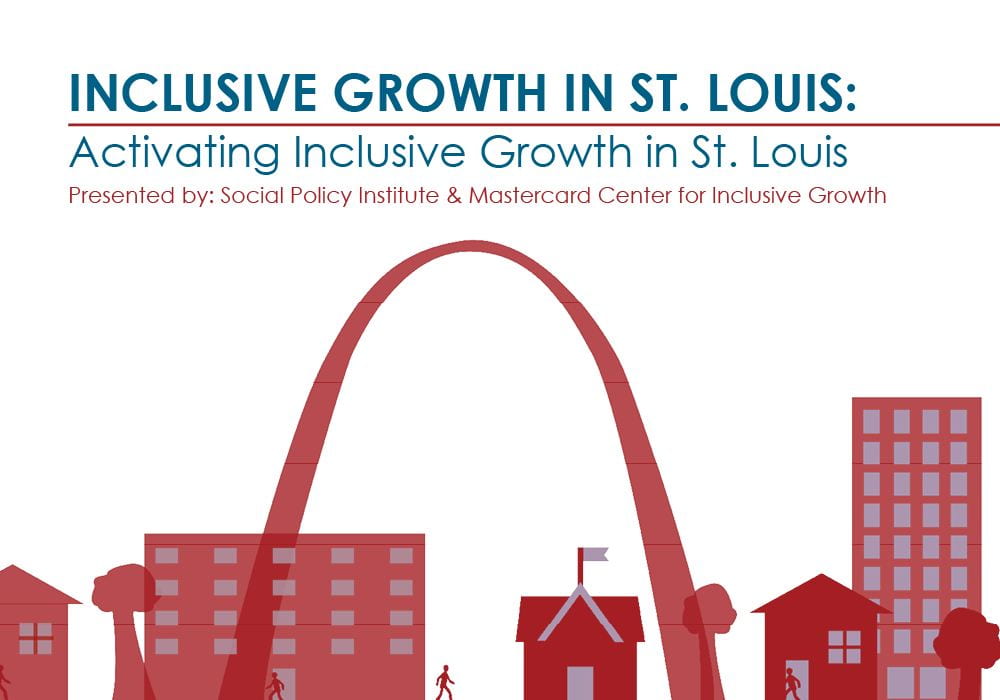On Dec. 9, 2021, we learned how to influence policy and collaborate with like-minded people to activate change in our last Inclusive Growth in St. Louis event.
After a year of events investigating why economic growth in St. Louis benefits some groups of people more than others and how we can change systems to support more inclusion, it’s time to activate change—together.
Thursday marked the final event in our 6-part Inclusive Growth event series, but in many ways, this is where the work begins. We asked you to identify your role in making St. Louis more inclusive, and we did the same.
The Social Policy Institute will continue to partner with organizations in St. Louis to evaluate and scale up promising solutions that lead to equitable policies and growth. We’re committed to increasing representation on our staff and research, working directly with communities we serve throughout the research process. And we will continue to support and collaborate with Washington University’s “in St. Louis, for St. Louis” initiative.
Ground Setting & Policy in Practice Panel
Bill Rodgers, vice president and director of the Institute for Economic Equity at the Federal Reserve Bank in St. Louis set the stage with a presentation about the current economic and wealth situation in St. Louis. Attendees also listened to St. Louis-based policymakers as they shared insights about how to create actionable change to local systems.
Slides from St. Louis Federal Reserve Presentation
Breakout Sessions
Education, Training and Technology: Building a talent pipeline
- Ron Daugherty, president and CEO, Daugherty Business Solutions, Access Point
- Atia Thurman, assistant teaching professor, director of student engagement and support, Brown School at Washington University in St. Louis
- Stacey Fowler, director of strategic workforce and compliance inclusion, St. Louis Development Corporation
Supporting small/minority-owned businesses
- Maureen Brinkley, district director of the St. Louis office, U.S. Small Business Administration
- Clayton Evans, senior vice president and community affairs officer, Simmons Bank
- Marnée Morgan, CEO and principal consultant, Morgan Graves Consultant LLC
Neighborhood and community investments
- Jenny Connelly-Bowen, executive director, Community Builder Network
- Maranda Witherspoon Richardson, CEO and principal, MWR Coaching and Consulting
- April Ford Griffin, executive director, Affordable Housing Commission
Slides from Community Builder Network presentation.
Financial inclusion and wealth building
- Adam Layne, treasurer, City of St. Louis
- Jacqueline Hutchinson, St. Louis Regional Financial Empowerment Coalition
- Crystal Avery-Morris, vice president of community development, Commerce Bank
Unfortunately, we were unable to record this breakout session.
Resources:
- A product of this event series is a contact list of individuals interested in creating inclusive growth in St. Louis. To access this list, please email us at socialpolicyinstitute@wustl.edu.
- Fill out this commitement form to identify how you can take a step towards creating inclusive growth.
- Discover more about inclusive neighborhoods by reading the STL Affordable Housing Report Card.
- Learn how small businesses can be better supported during a crisis through Building a Better Safety Net for Small Businesses an op-ed by Mastercard and SPI.
- Explore the U.S. Small Business Administration Small Business Resource Guide Central and Eastern Missouri Edition 2019-2020.
- The St. Louis Development Corporation (SLDC) is drafting an Economic Justice Action Plan for our city that centers engagement, equity, transparency and accountability in how development decisions are made and implemented. Take the survey to add your perspective by Dec. 17, 2021.
- Read the 15 Actionable Strategies to Embracing Inclusive Leadership identified by St. Louis leaders through our fifth event.
- Slides from St. Louis Federal Reserve presentation
- Slides from Community Builder Network presentation
About Inclusive Growth in St. Louis Events
This 6-part event series, Inclusive Growth in St. Louis, will investigate who is left out of St. Louis’ economic growth benefits, the policies that have led to the unequal distribution of opportunities, and actionable recommendations to become a more inclusive economy.
The series is designed by an advisory committee comprised of local individuals that are passionate about building an inclusive community with equitable opportunities for all, and features community leaders as speakers. The series is made possible through a partnership with the Social Policy Institute at Washington University in St. Louis and Mastercard Center for Inclusive Growth.


One Comment
Comments are closed.